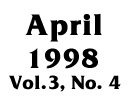



|

| |

| ||
|
|
by Connie Schulz Portal: Take It From a Beginner Contributor guidelines for "Beyond Dominia" indicate that prospective contributors should be knowledgeable about their subject matter in order to present the reader with the most valuable material possible. As a "newbie," I would ordinarily bow in obesiance to the vaunted knowledge possessed by the other contributors; however, in this area, a beginner's perspective is a much-needed one. Portal is, after all, intended as a beginner's game. I have a better way of looking at it; if you want to begin to play MtG, you should go and buy some 5th Edition cards and teach yourself to play. If you want to learn how to play chess, it really doesn't help all that much to learn to play checkers first. Same board, similar look to the game; totally different rules, objectives, and strategy involved. On the other hand, some people just like to play checkers, or both chess and checkers. If we carry the analogy through to the collectible card game genre, it's easy to see that in some situations a person might want to play Portal rather than regular MtG. Why? I had several reasons to choose to buy Portal cards as my initial foray into the world of collectible card games. As a former fan of role-playing games like AD&D and Warhammer, I had been aware of the existence of CCGs like MtG for some time, but hadn't played yet. Graduation into the "real world" with a "real job" left me with little time to spend gaming and even less money. Gone were the days when I could blow my whole paycheck at the hobby shop or get together with a dozen friends to pull an all-night gaming session. CCGs seemed like the perfect solution. But there isn't anything fun about losing every game you play-- finding playing partners for MtG almost always means playing someone who had 50 zillion cards and has so many more options for deck-building than a beginner that it wouldn't even be fun to play, nor easy to convince someone to make an investment in playing. Playing within the limited confines of the world of Portal is a great way to have the same options available as all of your opponents without a great initial outlay of cash. It's a fantastic opportunity to dig into the genre deeply enough to find out if you really like this type of game play before you decide to make a larger-scale investment in 5th Edition and expansion sets. Portal is a feasible way of "dipping your toes in" while still being able to win a game or two. A few other things I like about Portal: the art is consistently great, in comparison to some of the MtG card art I've seen, which can be less-than-consistently stellar. It's a game I can teach my mom, my little brother, my co-workers over lunch-- there's a much faster learning curve than for regular MtG. Yes, anyone CAN learn to play with 5th Edition cards, but most people really don't want to put in the time investment in learning the intricacies of the turns, the card interactions, etc. Thus the number of potential playing partners I have goes way up. What fun is a game if no one can play it with me? And out of those people I can convince to play Portal, some of them will be ready to move with me into more complicated game play like that found in 5th Edition. In short, I think it's best to think of Portal and its ilk (the upcoming "Second Age") as an "everyman's" alternative to Magic: the Gathering, rather than as a "beginner's version." After all, going through a portal shouldn't be thought of as the "easy part" of any journey. It's only the first step; why shouldn't the first step be one that gives you a fair taste of things to come, and then steps back and lets you decide whether or not to continue?
All commentaries are the opinions of the author, and do not necessarily reflect those of Beyond Dominia
|